For the past 20 years, the HSRC has been involved in electoral research in support of the Independent Electoral Commission. With debates focusing on a predicted era of coalition governments ahead of the national and provincial elections on 29 May, this article looks at understanding public perceptions of coalition governments. Given the nation’s history of apartheid and its subsequent transition to democracy, it is plausible that perceptions regarding coalitions are rooted in broader sentiments about political representation, inclusivity and power-sharing. By Jare Struwig, Narnia Bohler-Muller, and Ben Roberts.
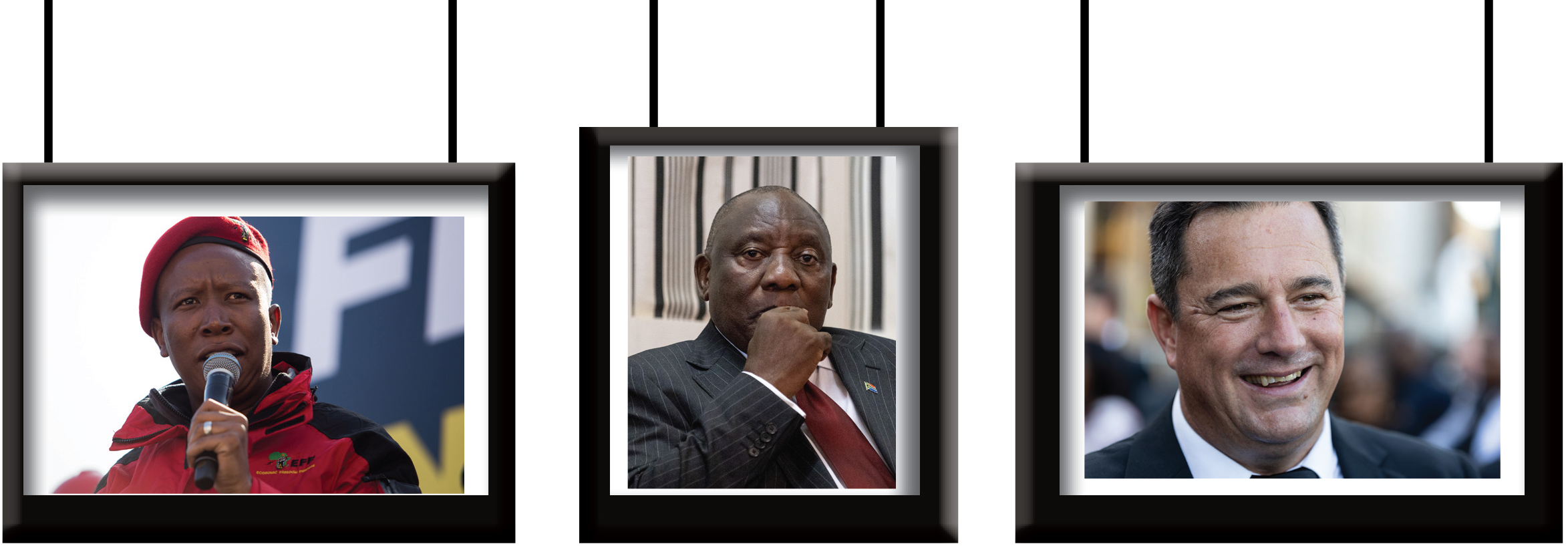
Photos: Ashraf Hendricks/GroundUp (CC BY-ND 4.0)
Along with the increasing fragmentation of the political landscape and the rise of smaller parties, coalitions are likely to become more prevalent and more powerful in South African politics. Understanding public perceptions about coalitions, therefore, is as valuable from a research perspective as it is for political parties, policymakers and civil society to navigate coalition dynamics effectively, and to help build consensus.
The HSRC’s South African Social Attitude Survey (SASAS) and the Voter Participation Survey (VPS) collect data on public perceptions related to politics, voting and governance. These surveys reach a representative sample of people living in South Africa aged 16 years and older, obtaining perspectives from different race groups, people from different socio-economic backgrounds and provinces, and from rural and urban areas.
Preference for single-party versus coalition governments
In 2014 and 2023, South Africans were asked whether a single-party government or a multiparty coalition government would be best for South African democracy in general. In the 2014 SASAS survey, 39% of respondents preferred a single-party government, with the same percentage favouring a coalition government involving two or more parties (Fig. 1). Just under a fifth (17%) indicated that their preference depended on contextual circumstances, while the remaining 5% were unsure as to how best to respond.
When repeated in 2023 using the VPS survey, the results showed that there had been a slight shift in preference, with 43% favouring a single-party government, a slight increase from 2014. Conversely, support for coalition governments decreased more significantly from 39% to 30%. Despite the increase in coalition governance in the past decade, support for coalition governance did not grow sequentially – possibly as a result of many challenges of coalitions at municipal level.
Figure 1. Preference for single-party or coalition government as being best for democracy (2014 and 2023, %)
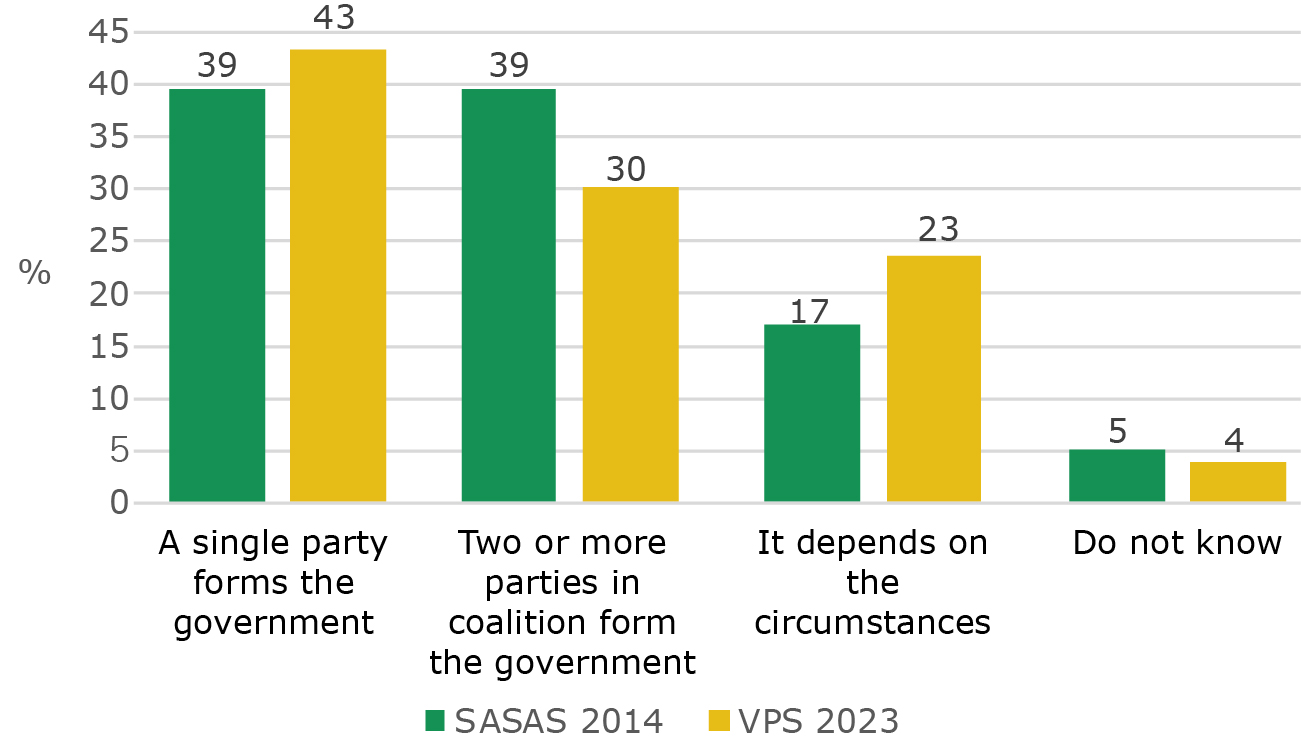
Source: HSRC
South African coalition preferences in comparative perspective
Results from Round 6 (2012/13) of the European Social Survey (ESS) help contextualise South African preferences for or against coalition governments by providing comparative data using the same survey measure. In particular, the use of the ESS data assists in answering the question as to whether the observed level of support for coalition governance in the country is high, low or in between.
Figure 2. Preference for single-party or coalition-party government: South Africa in comparative perspective (2014, ranked high to low based on the share answering that it would be best for democracy if there were “two or more parties for the government” in coalition)
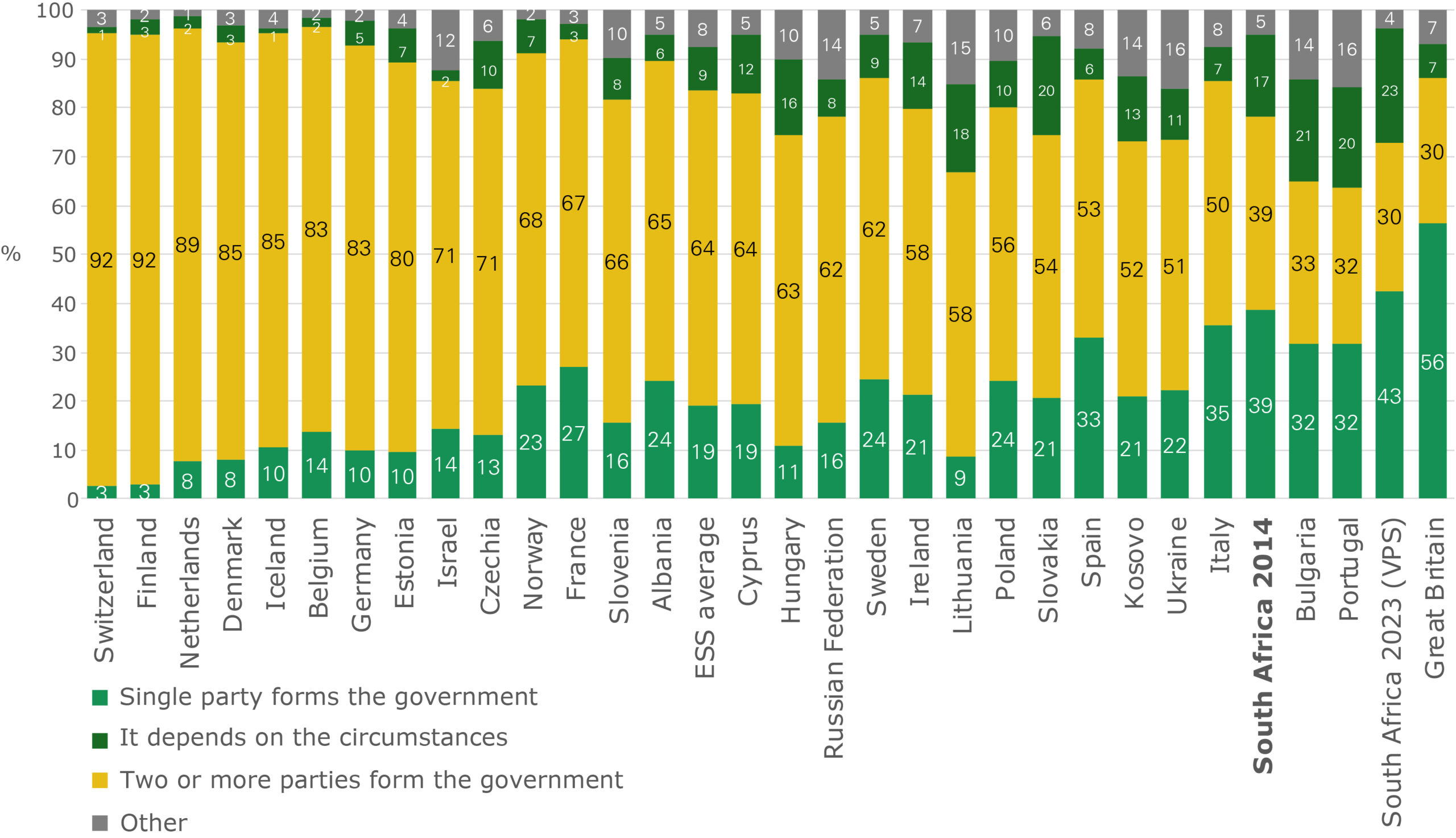
Source: HSRC SASAS 2014 and ESS ERIC Round 6 (2012/13)
The comparative analysis reveals that, on average, South Africans were less supportive of coalition governments than in many other countries (Fig. 2). South Africa ranked fourth lowest in terms of preference for a coalition government among the countries that participated in the ESS round. Only Bulgaria, Portugal and Great Britain were less in favour of a coalition government than South Africa at the time. The scale of variation between South Africa and the European countries most in favour of coalition government is appreciable – compared to the 30% support for this type of governance in South Africa, it approximates 90% in countries such as Switzerland, Finland and the Netherlands.
In the intervening decade since 2014, the preference for coalition government at the national level observed in Figure 1 points to declining support for this governance option, despite (or perhaps as a result of) its increasing commonality at the municipal level, where party politics interfere with service delivery.
Degrees of consensus in South African preferences
We examined the socio-demographic and spatial differences in the preference for coalition government over single-party government in the country in 2014 and 2023. In 2014, there were no observable differences in support for this form of governance based on age, gender, educational attainment, subjective poverty status or the lived experience of a coalition government at local municipality level. The main basis of variation was along racial and provincial lines.
In 2023, age differences in support for coalition government remained insignificant, and there were only marginal differences along gender and educational lines. However, clearer differences in support were apparent based on race, subjective poverty status, socio-economic status, the lived experience of coalition government at local municipality level and province of residence. However, if we add all these variables together into a regression analysis, only provincial differences remain significant. These are displayed in Table 1 and indicate higher than average support for coalitions in 2023, as evident in the Free State, Northern Cape and Gauteng. In all other provinces, a single-party government remained the dominant preference.
Table 1. Preference for single-party or coalition-party government by province (VPS, 2023)
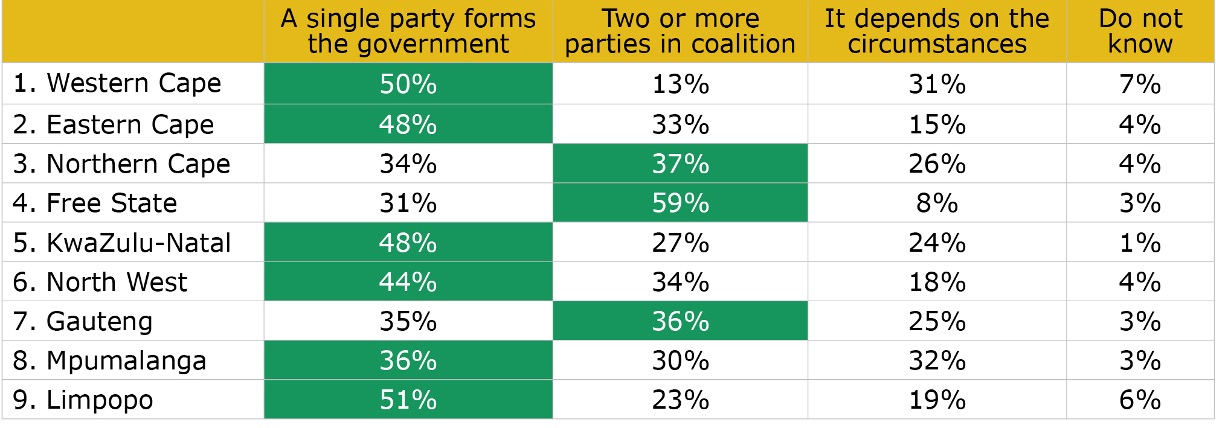
Source: HSRC
What are the other drivers of support for a coalition government in South Africa?
1. Political support measures
We tested the effect of political party support on coalition preferences in SASAS datasets from 2014 and 2023 (political support was not included in the VPS of 2023). In both years of surveying, there was not a statistically significant difference in coalition preferences among political parties, even after socio-demographic and spatial measures were added as controls. This result is interesting, given the increasing commonality of coalition talks among political parties at national, provincial and municipal levels. This finding suggests that, for now, supporters of different political parties tend to express similar levels of support for coalitions on average.
2. The influence of other coalition beliefs
To determine whether other coalition beliefs informed overall preference for coalition governance, South Africans were asked whether they would support their party entering a coalition post-election, feel betrayed if the party they voted for formed a coalition post-election, and if they believed coalitions would enhance service-delivery performance. From Figure 3, it is evident that more than half (56%) are open to their party of choice entering a coalition, with 23% opposing this and 22% neutral or uncertain. Just under half were also positive that coalitions would improve service delivery in the country, while 26% were doubtful and 27% were neutral or uncertain. Around two-fifths (39%) felt that parties entering coalitions post-electorally represented a betrayal of voter choice, with an equivalent share refuting this critical assessment.
Figure 3. Other coalition beliefs (2023, %)
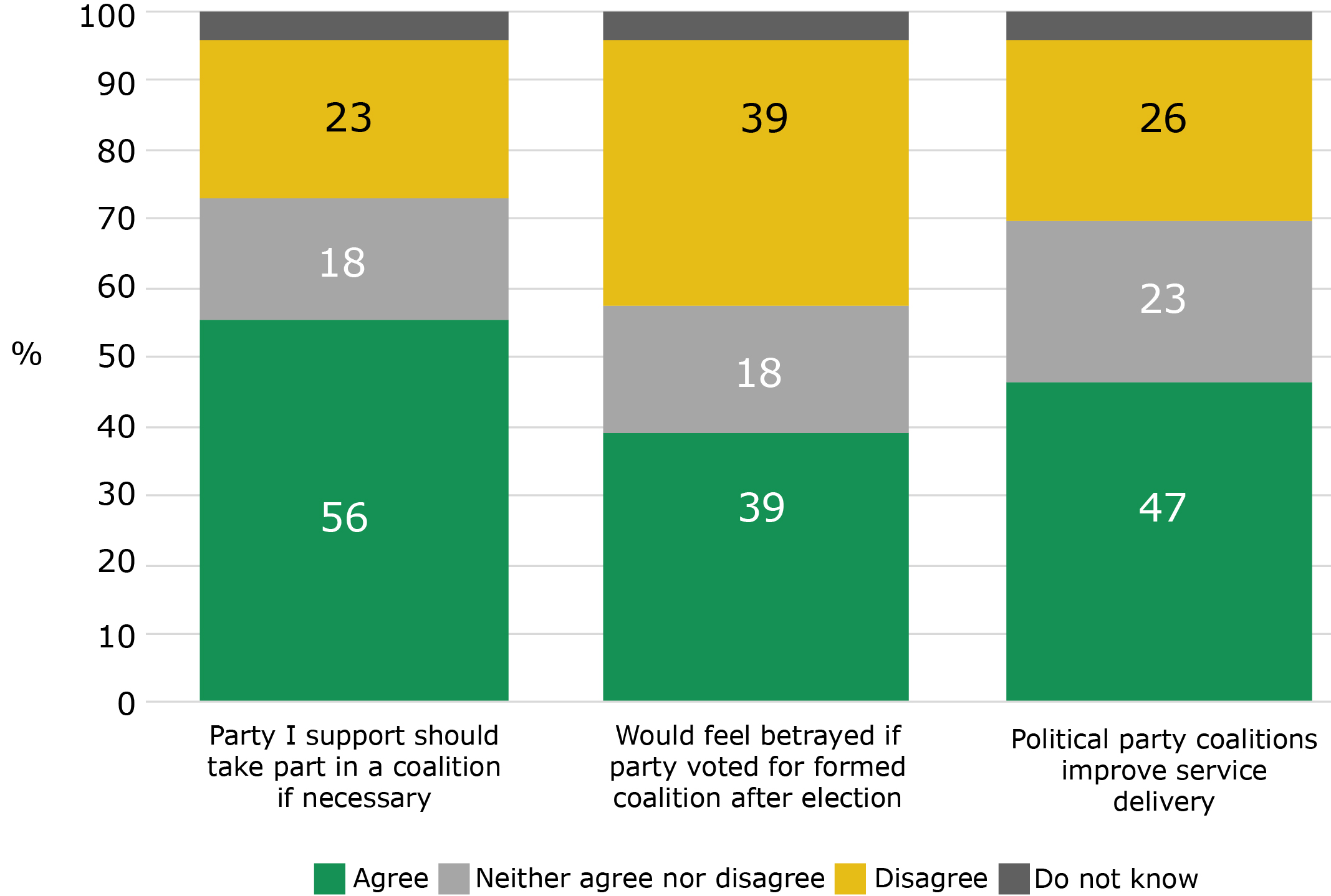
Source: HSRC
Tests using regression analysis found that support for: (a) one’s party entering a coalition; (b) rejecting the idea that coalitions are a betrayal of voter choice; and (c) a belief that coalitions may result in better service performance all emerged as significant predictors of general support for a coalition government in South Africa. Unsurprisingly, these beliefs had the strongest effects on preferences, and further reduced the influence of socio-demographic, spatial and political factors.
Of the three beliefs tested on general support for coalition government in the country, the regression analysis showed that the strongest influence – by a considerable margin – was a belief in positive service delivery outcomes. As Figure 4 shows, 47% of those supporting such a view were partial to coalition governance in the country, compared to a mere 11% of those who were sceptical of improved service performance. It would seem that support for coalitions is strongly based on perceptions of whether such arrangements will improve service delivery. Support for single-party governance or coalition governance therefore seems to be driven by perceptions of improved services rather than a specific political ideology. Convincing the electorate of service improvements will be instrumental in bolstering support for coalitions in future electoral contests.
Figure 4. The influence of service-delivery outcomes on support for coalition government (2023, %)

Source: HSRC
Conclusion
The findings of the survey analysis presented above shed light on the complex landscape of public opinion regarding political party coalitions in South Africa. On examination of representative data from 2014 and 2023, the preference for coalition governments has shown a slight decline in observed support. Despite this finding, a considerable portion of the population remains open to the idea of coalition governance, albeit with nuanced differences across certain demographic and spatial variables.
A comparative analysis with select European countries highlights South Africa’s relatively lower support for coalition governments. However, certain provinces, such as the Free State, Northern Cape and Gauteng, exhibit higher-than-average support for coalitions, indicating regional variations in preference.
Furthermore, political allegiance appears to have surprisingly minimal influence on coalition preferences at this stage, with supporters of different parties expressing similar levels of support for coalition governance. Instead, beliefs such as the perceived impact on service delivery and the acceptance of parties entering coalitions post-election, emerge as significant predictors of general support for coalition government in South Africa.
In conclusion, while coalition governance remains a divisive issue in South Africa, there is a notable segment of society that favours the concept, particularly when reinforced by positive expectations of outcome and a mature political view that coalition politics does not equate to a betrayal of voter choice. As the country’s political landscape continues to evolve, understanding these nuances in public opinion is essential for policymakers and stakeholders to navigate coalition dynamics effectively and foster consensus-building in the pursuit of democratic consolidation and social cohesion in South Africa.
Research contacts:
Dr Jarè Struwig, chief research specialist, Dr Ben Roberts, research director, and Prof. Narnia Bohler-Muller, executive head, of the HSRC’s Developmental, Ethical and Capable State research division


